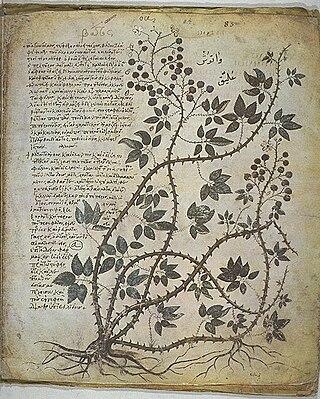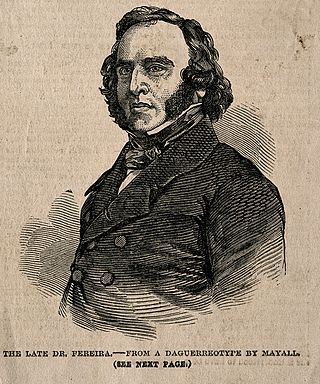
Pedanius Dioscorides, "the father of pharmacognosy", was a Greek physician, pharmacologist, botanist, and author of De materia medica, a 5-volume Greek encyclopedia about herbal medicine and related medicinal substances, that was widely read for more than 1,500 years. For almost two millennia Dioscorides was regarded as the most prominent writer on plants and plant drugs.

Materia medica is a Latin term from the history of pharmacy for the body of collected knowledge about the therapeutic properties of any substance used for healing. The term derives from the title of a work by the Ancient Greek physician Pedanius Dioscorides in the 1st century AD, De materia medica, 'On medical material'.

A genizah is a storage area in a Jewish synagogue or cemetery designated for the temporary storage of worn-out Hebrew-language books and papers on religious topics prior to proper cemetery burial.

Chinese herbology is the theory of traditional Chinese herbal therapy, which accounts for the majority of treatments in traditional Chinese medicine (TCM). A Nature editorial described TCM as "fraught with pseudoscience", and said that the most obvious reason why it has not delivered many cures is that the majority of its treatments have no logical mechanism of action.

Pharmacognosy is the study of crude drugs obtained from medicinal plants, animals, fungi, and other natural sources. The American Society of Pharmacognosy defines pharmacognosy as "the study of the physical, chemical, biochemical, and biological properties of drugs, drug substances, or potential drugs or drug substances of natural origin as well as the search for new drugs from natural sources".

The Cairo Geniza, alternatively spelled Genizah, is a collection of some 400,000 Jewish manuscript fragments and Fatimid administrative documents that were kept in the genizah or storeroom of the Ben Ezra Synagogue in Fustat or Old Cairo, Egypt. These manuscripts span the entire period of Middle-Eastern, North African, and Andalusian Jewish history between the 6th and 19th centuries CE, and comprise the largest and most diverse collection of medieval manuscripts in the world.

Medicinal plants, also called medicinal herbs, have been discovered and used in traditional medicine practices since prehistoric times. Plants synthesize hundreds of chemical compounds for various functions, including defense and protection against insects, fungi, diseases, and herbivorous mammals.
Stefan Clive Reif is professor emeritus at the University of Cambridge. He was born in Edinburgh. He has a PhD from University College London and a Doctor of Literature from Cambridge.

Jonathan Pereira FRS was a pharmacologist, author of the Elements of Materia Medica, a standard work. He was examiner on the subject in the University of London.
Li Shizhen, courtesy name Dongbi, was a Chinese acupuncturist, herbalist, naturalist, pharmacologist, physician, and writer of the Ming dynasty. He is the author of a 27-year work, the Compendium of Materia Medica. He developed several methods for classifying herb components and medications for treating diseases.

Moshe Gil was an Israeli historian.

Norman Arthur Stillman, also Noam, is an American academic, historian, and Orientalist, serving as the emeritus Schusterman-Josey Professor and emeritus Chair of Judaic History at the University of Oklahoma. He specializes in the intersection of Jewish and Islamic culture and history, and in Oriental and Sephardi Jewry, with special interest in the Jewish communities in North Africa. His major publications are The Jews of Arab Lands: a History And Source Book and Sephardi Religious Responses to Modernity. In the last few years, Stillman has been the executive editor of the "Encyclopedia of Jews in the Islamic World", a project that includes over 2000 entries in 5 volumes.

Joseph Yahalom is a professor of Hebrew literature at the Hebrew University of Jerusalem. Since 1983, he has been a member of the Academy of the Hebrew Language.

Quercus infectoria or the Aleppo oak is a species of oak well known for producing galls that have been traditionally used for centuries in Asia medicinally while also used in softening leather and in making black dye and ink.

Zohar Amar is a professor in the Department of Land of Israel Studies at the religious-Zionist Bar-Ilan University, whose research specialties are: natural history in ancient times; the identification of the flora of the Land of Israel and identification of the fauna of the Land of Israel according to descriptions in classical Jewish sources; the material culture and realia of daily life in the Middle Ages as reflected in agriculture and commerce; the history of medicine and ethno-pharmacology. His research integrates diverse fields of knowledge, including branches of natural science, history, archaeology, linguistics, and Judaic studies.

The history of pharmacy as a modern and independent science dates back to the first third of the 19th century. Before then, pharmacy evolved from antiquity as part of medicine. The history of pharmacy coincides well with the history of medicine, but it's important that there is a distinction between the two topics. Pharmaceuticals is one of the most-researched fields in the academic industry, but the history surrounding that particular topic is sparse compared to the impact its made world-wide. Before the advent of pharmacists, there existed apothecaries that worked alongside priests and physicians in regard to patient care.

Moussa B. H. Youdim is an internationally renowned Israeli neuroscientist specializing in neurochemistry and neuropharmacology. He is the discoverer of both monoamine oxidase (MAO) B inhibitors l-deprenyl (Selegiline) and rasagiline (Azilect) as anti-Parkinson drugs which possess neuroprotective activities. He is currently professor emeritus at Technion - Faculty of Medicine and President of Youdim Pharmaceuticals.

De materia medica is a pharmacopoeia of medicinal plants and the medicines that can be obtained from them. The five-volume work was written between 50 and 70 CE by Pedanius Dioscorides, a Greek physician in the Roman army. It was widely read for more than 1,500 years until supplanted by revised herbals in the Renaissance, making it one of the longest-lasting of all natural history and pharmacology books.
Muhammad ibn Sa'id al-Tamimi, , known by his kunya, "Abu Abdullah," but more commonly as Al-Tamimi, was a tenth-century physician, who came to renown on account of his medical works. Born in Jerusalem, Al-Tamimi spent his early years in and around Jerusalem where he studied medicine under the tutelage of two local physicians, Al-Hasan ibn Abi Nu'aym, and a Christian monk, Anba Zecharia ben Thawabah. Al-Tamimi possessed an uncommon knowledge of plants and their properties, such that his service in this field was highly coveted and brought him to serve as the personal physician of the Ikhshidid Governor of Ramla, al-Hassan bin Abdullah bin Tughj al-Mastouli, before being asked to render his services in Old Cairo, Egypt. Around 970, Al-Tamimi had settled in Fustat, Egypt, and there prospered in his medical field, writing a medical work for the vizier, Ya'qub ibn Killis (930–991), a Baghdadi Jew who came to work in Egypt under the auspices of the Fatimids. He specialized in compounding simple drugs and medicines, but is especially known for his having concocted a theriac reputed as a proven antidote in snakebite and other poisons, which he named tiryaq al-fārūq because of its exceptional qualities.

Nathan ben Abraham, known also by the epithet President of the Academy in the Land of Israel, was an 11th-century rabbi and exegete of the Mishnah who lived in Ramla, in the Jund Filastin district of the Fatimid Caliphate. He was the author of the first known commentary covering the entire Mishnah.

















